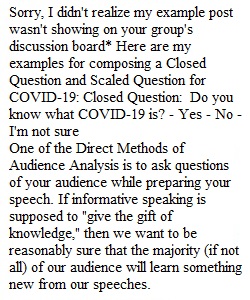


Q One of the Direct Methods of Audience Analysis is to ask questions of your audience while preparing your speech. If informative speaking is supposed to "give the gift of knowledge," then we want to be reasonably sure that the majority (if not all) of our audience will learn something new from our speeches. There are two types of questions (also see pg. 73 in the textbook) that can help you do this: A) Closed Questions request a brief, specific answer like "Yes" or "No." B) Scaled Questions ask for responses along a continuum, which allows for more variance. On a scale of 1-5, 1 could represent "I know nothing about this" and 5 could represent "I am an expert on this subject." Directions: 1) Identify the topic you have settled on for your Informative Speech (if you have not made a final decision, choose a topic you are potentially interested in). Then, compose a Closed Question OR Scaled Question for your classmates to respond to that indicates how much they already know about your subject. Post that question as a reply to this discussion board. Posting your own question will count as attendance for today. 2) Before the end of Friday, 7/10, directly reply to all of your classmates' questions (see my video above). The goal is for everyone to get a significant enough number of responses to decide if their topic will benefit the class, if it needs to be revised, or is simply too well known and should be discarded. Responding to your classmates' questions will count for class participation credit.
View Related Questions